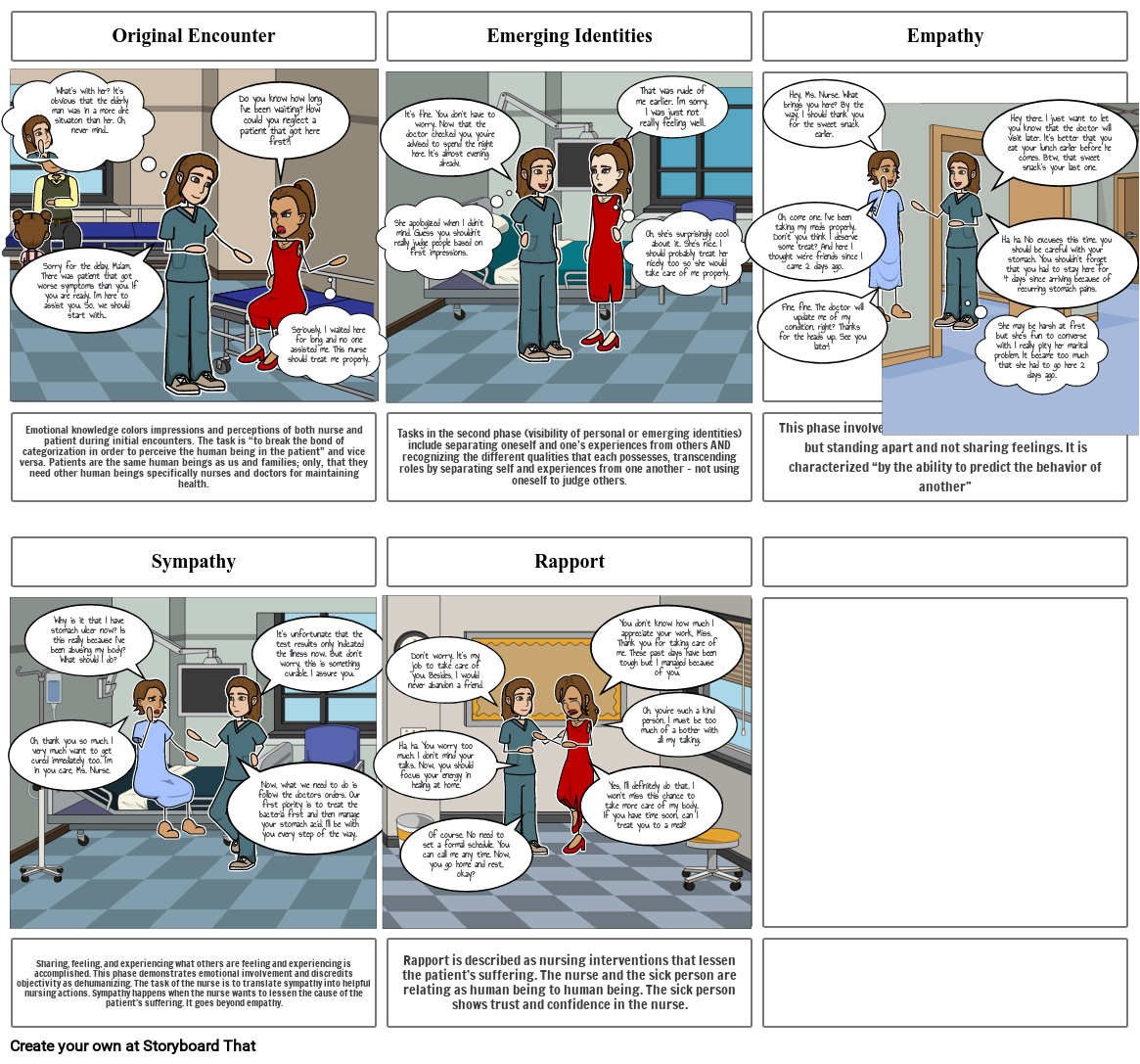Unknown Story

Storyboard Text
- What's with her? It's obvious that the elderly man was in a more dire situaton than her. Oh, never mind...
- Sorry for the delay, Ma'am. There was patient that got worse symptoms than you. If you are ready. I'm here to assist you. So, we should start with...
- Original Encounter
- Do you know how long I've been waiting? How could you neglect a patient that got here first?!
- She apologized when I didn't mind. Guess you shouldn't really judge people based on first impressions.
- It's fine. You don't have to worry. Now that the doctor checked you, you're advised to spend the night here. It's almost evening already.
- Emerging Identities
- Oh, she's surprisingly cool about it. She's nice. I should probably treat her nicely too so she would take care of me properly.
- That was rude of me earlier. I'm sorry. I was just not really feeling well.
- Oh, come one. I've been taking my meds properly. Don't you think I deserve some treat? And here I thought we're friends since I came 2 days ago.
- Fine, fine. The doctor will update me of my condition, right? Thanks for the heads up. See you later!
- Hey, Ms. Nurse. What brings you here? By the way, I should thank you for the sweet snack earlier.
- Empathy
- She may be harsh at first but she's fun to converse with. I really pity her marital problem. It became too much that she had to go here 2 days ago.
- Ha, ha. No excuses this time. you should be careful with your stomach. You shouldn't forget that you had to stay here for 4 days since arriving because of recurring stomach pains.
- Hey there. I just want to let you know that the doctor will visit later. It's better that you eat your lunch earlier before he comes. Btw, that sweet snack's your last one.
- Emotional knowledge colors impressions and perceptions of both nurse and patient during initial encounters. The task is “to break the bond of categorization in order to perceive the human being in the patient” and vice versa. Patients are the same human beings as us and families; only, that they need other human beings specifically nurses and doctors for maintaining health.
- Sympathy
- Why is it that I have stomach ulcer now? Is this really because I've been abusing my body? What should I do?
- It's unfortunate that the test results only indicated the illness now. But don't worry, this is something curable. I assure you.
- Seriously, I waited here for long and no one assisted me. This nurse should treat me properly.
- Don't worry. It's my job to take care of you. Besides, I would never abandon a friend.
- Tasks in the second phase (visibility of personal or emerging identities) include separating oneself and one’s experiences from others AND recognizing the different qualities that each possesses, transcending roles by separating self and experiences from one another – not using oneself to judge others.
- Rapport
- You don't know how much I appreciate your work, Miss. Thank you for taking care of me. These past days have been tough but I managed because of you.
- This phase involves sharing another’s psychological state but standing apart and not sharing feelings. It is characterized “by the ability to predict the behavior of another”
- Oh, thank you so much. I very much want to get cured immediately too. I'm in you care, Ms. Nurse.
- Sharing, feeling, and experiencing what others are feeling and experiencing is accomplished. This phase demonstrates emotional involvement and discredits objectivity as dehumanizing. The task of the nurse is to translate sympathy into helpful nursing actions. Sympathy happens when the nurse wants to lessen the cause of the patient’s suffering. It goes beyond empathy.
- Now, what we need to do is follow the doctors orders. Our first piority is to treat the bacteria first and then manage your stomach acid. I'll be with you every step of the way.
- Rapport is described as nursing interventions that lessen the patient’s suffering. The nurse and the sick person are relating as human being to human being. The sick person shows trust and confidence in the nurse.
- Of course. No need to set a formal schedule. You can call me any time. Now, you go home and rest, okay?
- Ha, ha. You worry too much. I don't mind your talks. Now, you should focus your energy in healing at home.
- Yes, I'll definitely do that. I won't miss this chance to take more care of my body. If you have time soon, can I treat you to a meal?
- Oh, you're such a kind person. I must be too much of a bother with all my talking.
Over 30 Million Storyboards Created

